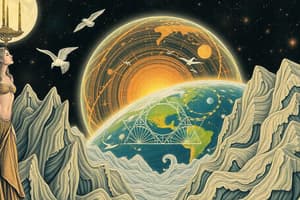Podcast
Questions and Answers
What is the study of Earth's structure and composition?
What is the study of Earth's structure and composition?
- Meteorology
- Oceanology
- Geology (correct)
- Astrology
What is the process that occurred from the compression of the dust and gas in the cloud?
What is the process that occurred from the compression of the dust and gas in the cloud?
- Gravitational attraction
- Radioactive decay
- Hydrogen fusion (correct)
- Nuclear fission
What is the shape of the Earth according to the text?
What is the shape of the Earth according to the text?
- A perfect sphere
- A prolate spheroid
- An oblate spheroid (correct)
- A irregular shape
What is the composition of the inner core?
What is the composition of the inner core?
What is the reason for the decrease in the Earth's heat over time?
What is the reason for the decrease in the Earth's heat over time?
What is the source of the electric current that forms the Earth's magnetic field, according to a hypothesis?
What is the source of the electric current that forms the Earth's magnetic field, according to a hypothesis?
What was the evidence that Alfred Wegener used to support his theory of continental drift?
What was the evidence that Alfred Wegener used to support his theory of continental drift?
What is the characteristic of the rocks found at mid-ocean ridges?
What is the characteristic of the rocks found at mid-ocean ridges?
What is formed at a divergent boundary?
What is formed at a divergent boundary?
What is the characteristic of the rocks around the Mid-Atlantic Ridge?
What is the characteristic of the rocks around the Mid-Atlantic Ridge?
Flashcards are hidden until you start studying
Study Notes
Geology
- Study of Earth's structure and composition
Origin of the Solar System
- The Nebular Hypothesis suggests that the sun formed from a swirling cloud of dust and gas around 4.6 billion years ago
- As the cloud shrank, rotation increased due to gravity, leading to hydrogen fusion and heating
Earth's Size and Shape
- The spinning motion of Earth formed a bulge, making it an oblate spheroid, not a perfect sphere
- Measuring the weight of objects in different places shows that Earth is not spherical
- Weight of objects tends to be heavier near the Earth's poles
Earth's Interior
- Collision of material left over from the solar system's formation led to the formation of Earth's cores and layers
- Inner core: solid iron and nickel
- Outer core: liquid iron and nickel
- Mantle: iron, silicon, and magnesium; Earth's thickest layer
- Crust: outermost layer, where life has been found
- Lithosphere: upper mantle and lower crust, floating above the asthenosphere
Earth's Heat
- Factors contributing to Earth's heat: decay of radioactive isotopes, weight of materials, and meteorite impacts
- Earth's heat has been decreasing since its formation due to rock thickness, heat loss rate, and percentage of radioactive materials
Earth's Magnetic Field
- Hypothesis: liquid iron in Earth produces an electric current, leading to the formation of the planet's magnetic field
Early Plate Tectonics
- Theory: the formation and movement of the Earth's crust
- Early explorers noted the movement of continents by comparing Africa's coast with east South America
- Alfred Wegener proposed that continents have been drifting apart, using the Mesosaurus as evidence
Modern Plate Tectonics
- Discoveries of magnetism and sea floor age provided evidence for plate movement
- Scientists revised Wegener's theory, adding that plates are part of a lithospheric plate covering the Earth's surface
- Volcanoes and earthquakes occur in concentrated belts at theoretical plate boundaries
The Ocean Floor
- Igneous rocks of the ocean floor are magnetic, providing information about plate movement
- Mid-ocean ridges show rocks changing polarity with each magnetic field reversal, indicating plate movement
- Rocks near the ridge are hotter than those further away
Divergent Boundaries
- Two lithospheric plates are pulling apart, forming rift valleys
- Fracture zones line the boundary where a fault lies perpendicular to the divergent boundary
- The crust is pulled apart, forming a new ocean floor
- Example: Mid-Atlantic Ridge
Convergent Boundaries
- A place where two plates are moving towards each other
Studying That Suits You
Use AI to generate personalized quizzes and flashcards to suit your learning preferences.




